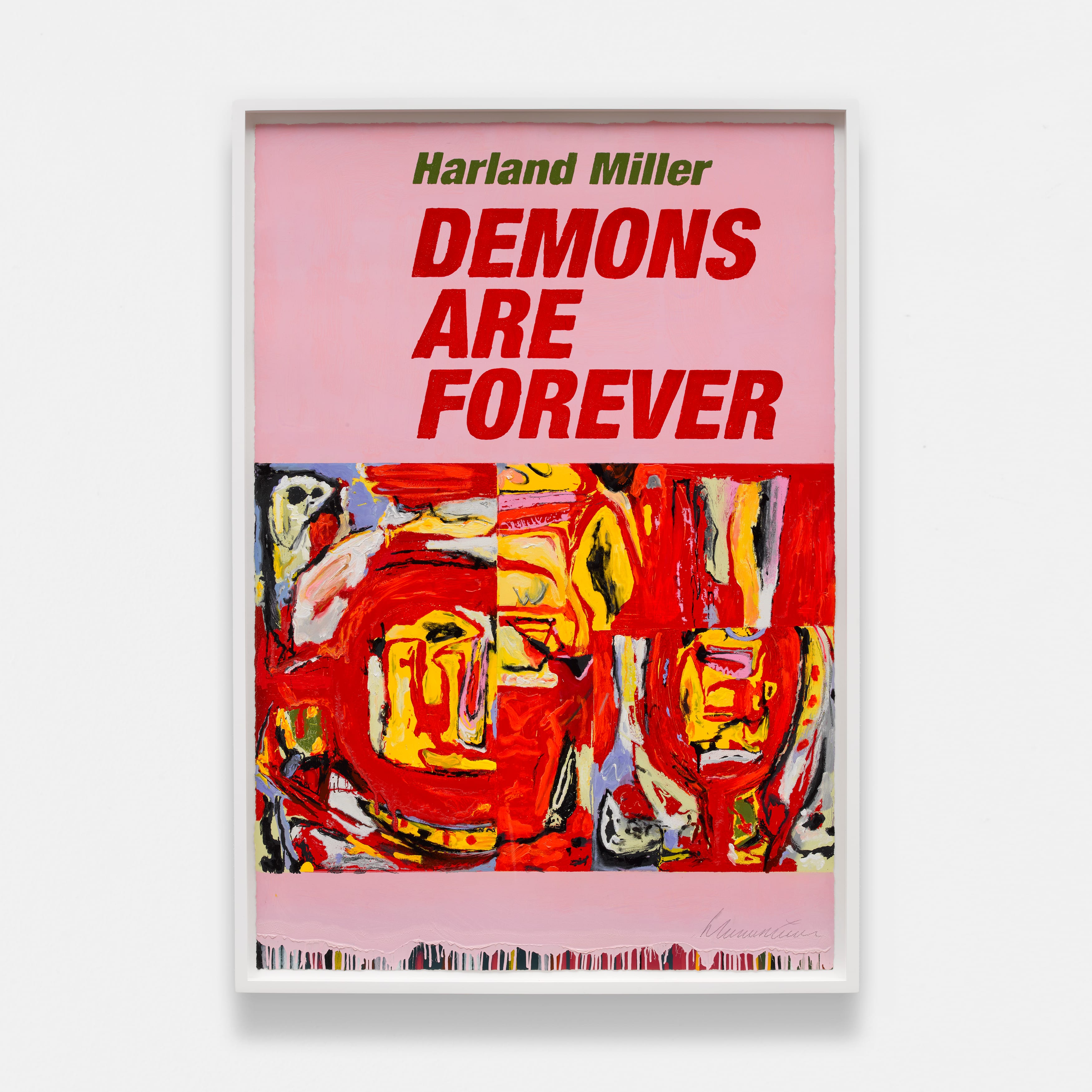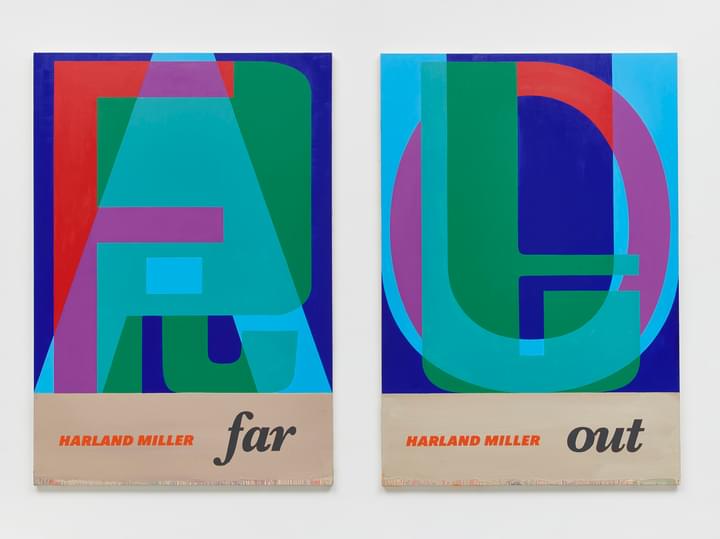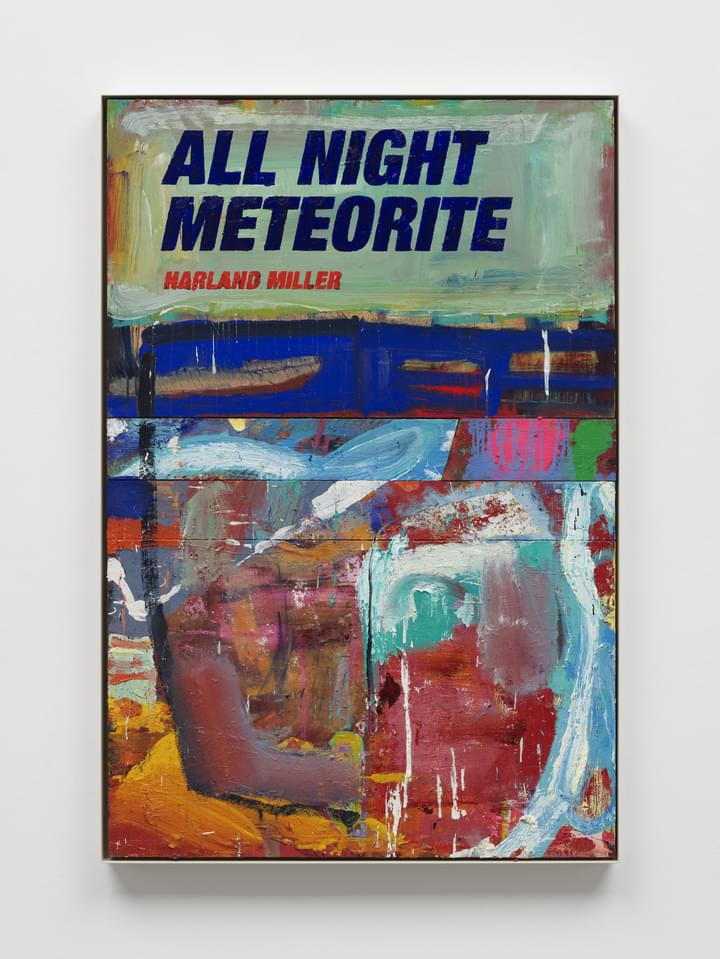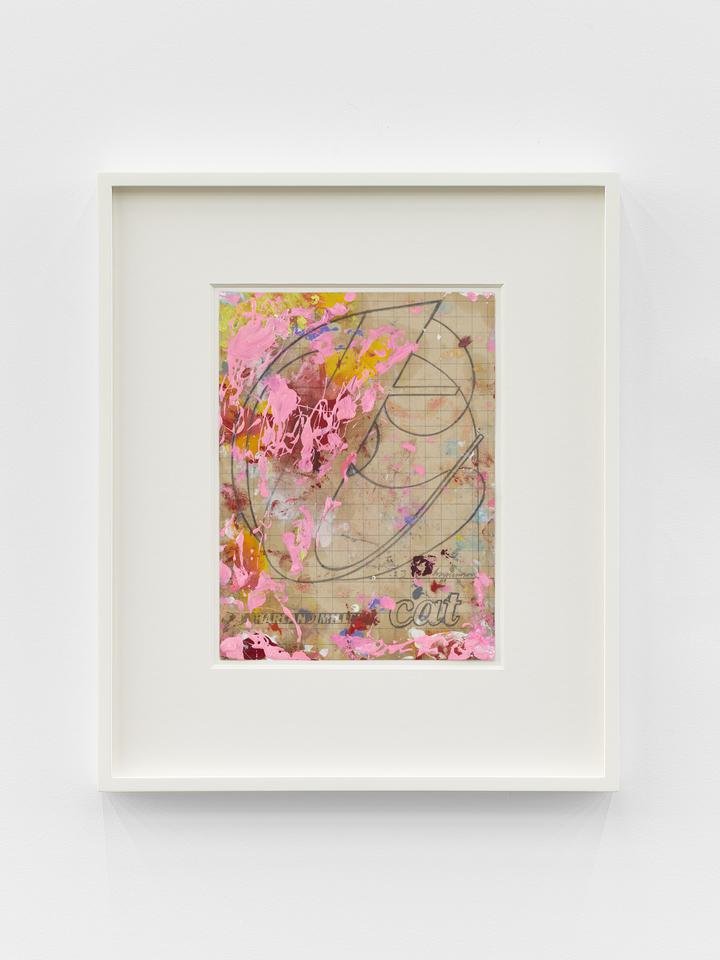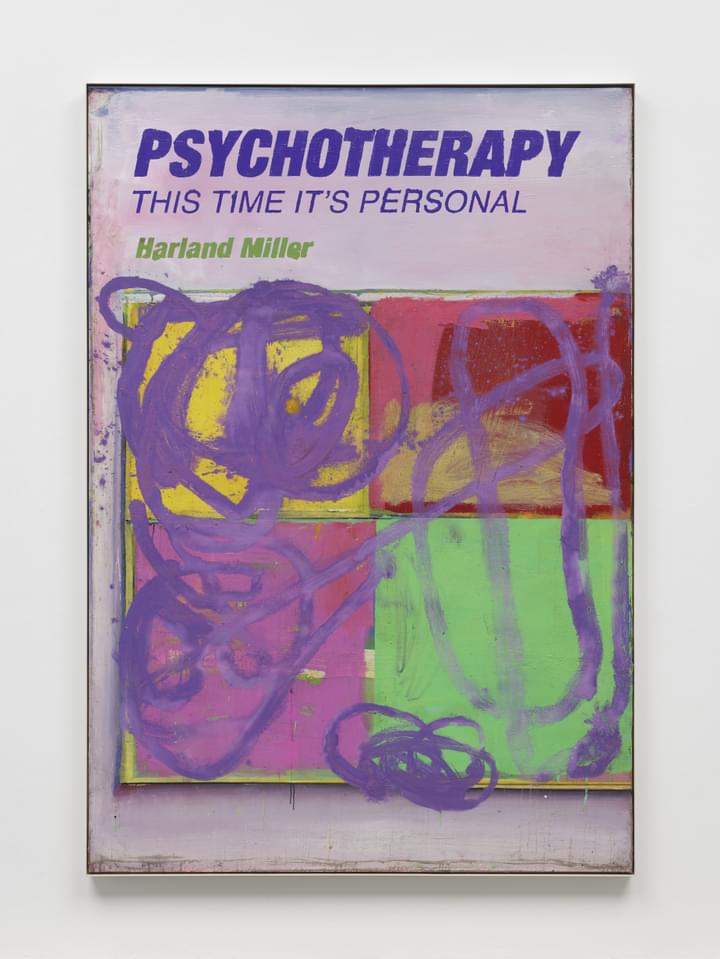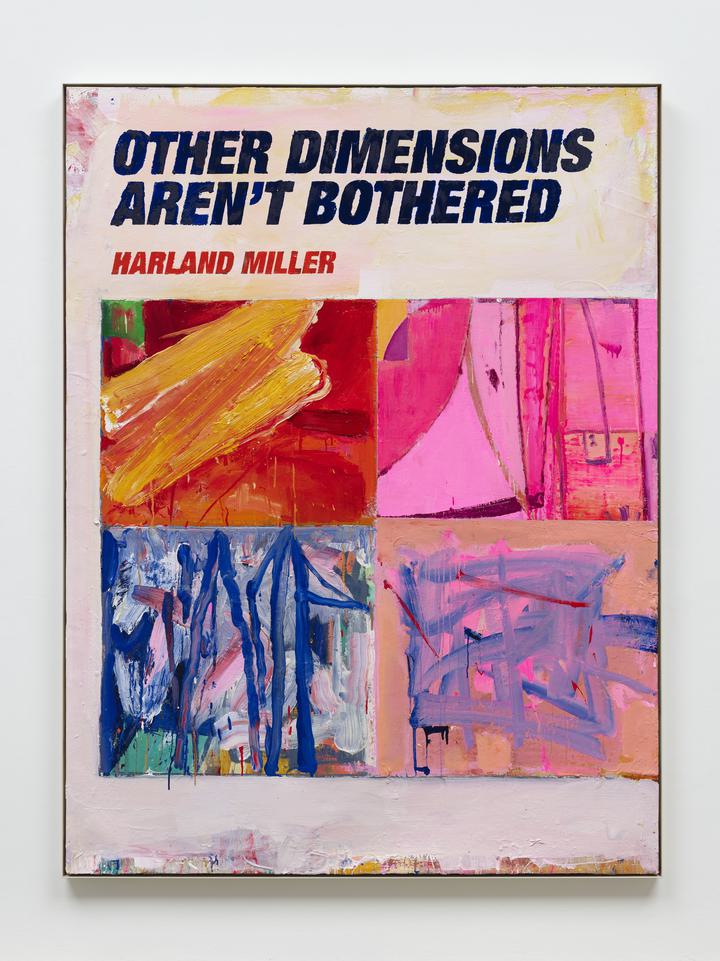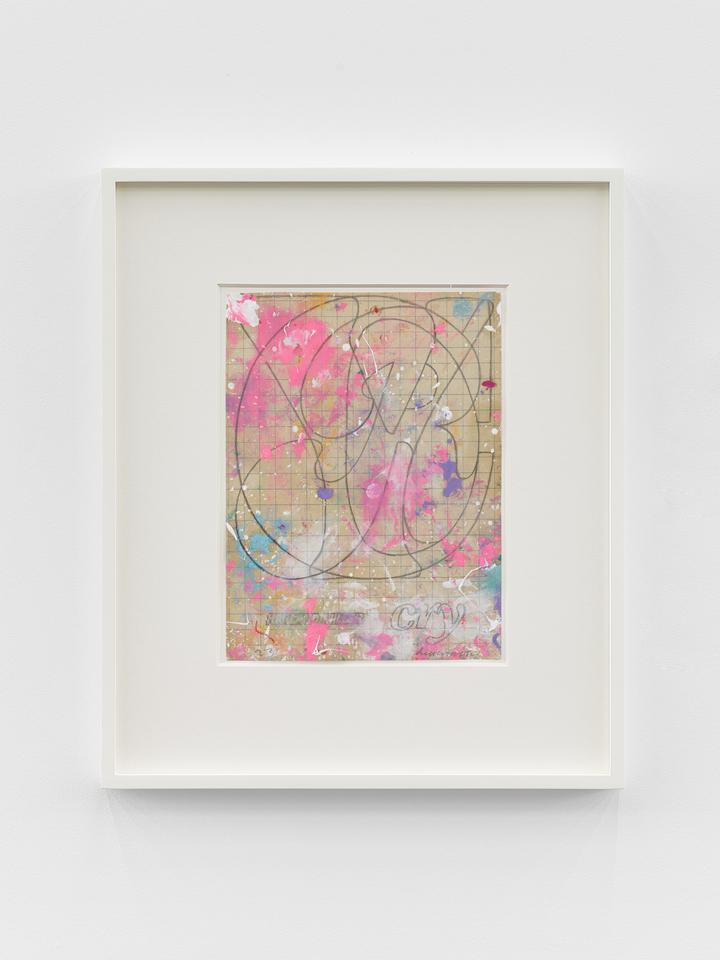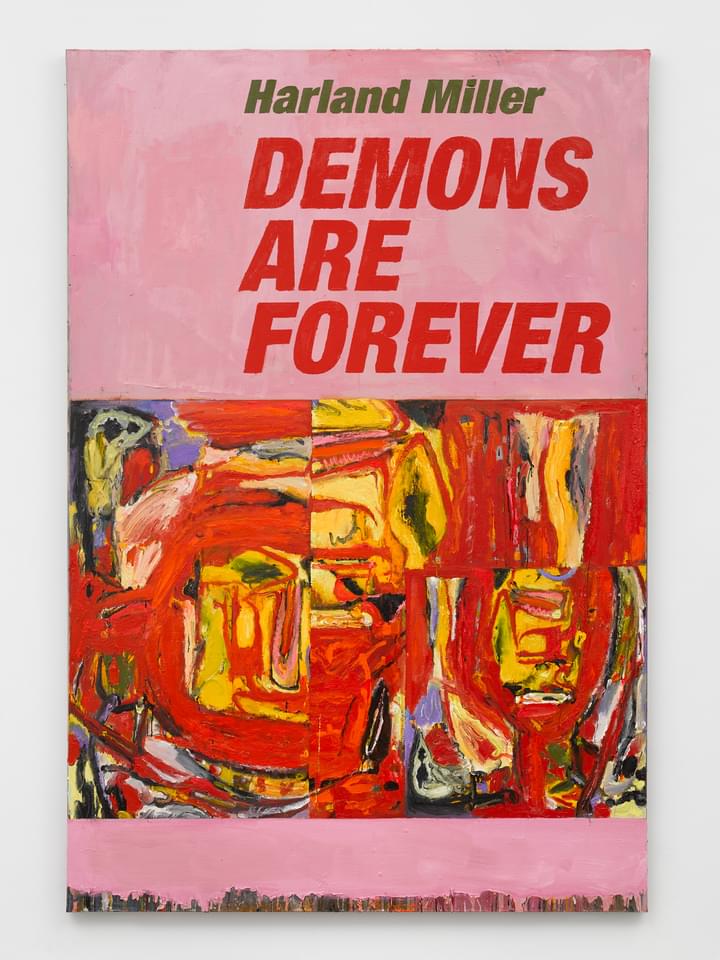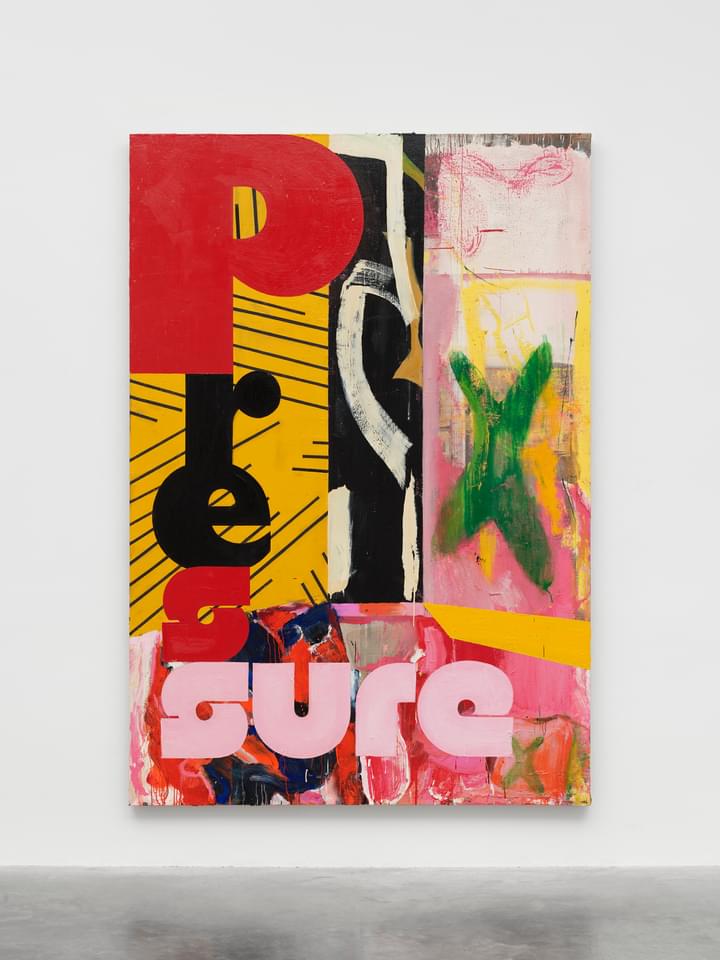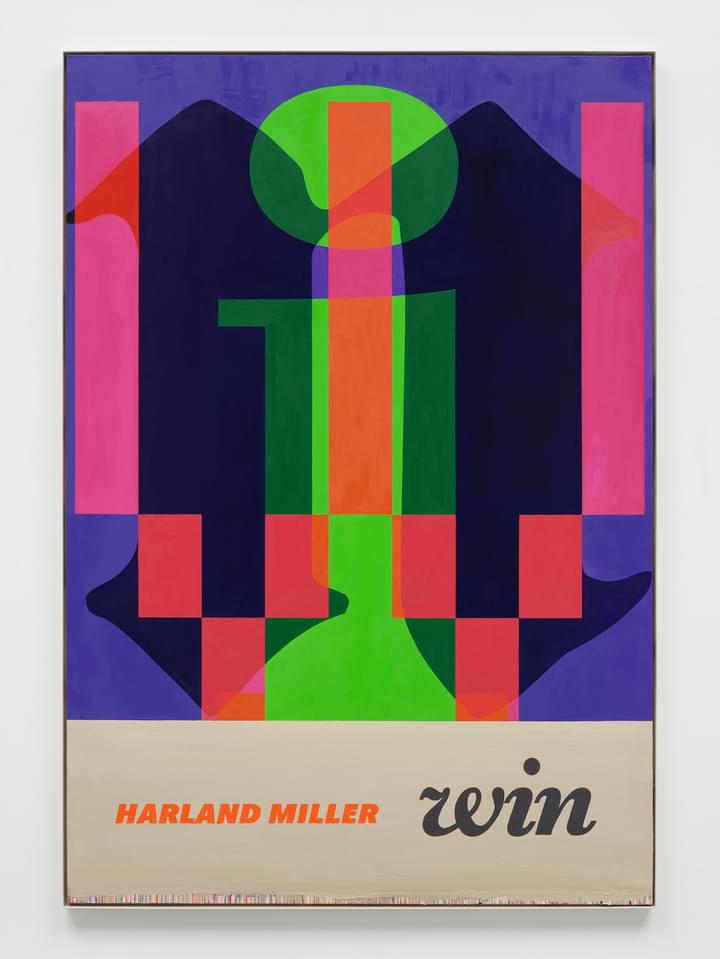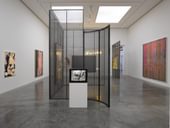A natural-born raconteur, Miller’s work draws on his life experiences; light anecdotes and darker truths that began in childhood. Growing up in Yorkshire in the 1970s – a period which Miller recalls was marked by ongoing electrical outages and overshadowed by the elusive presence of the Yorkshire Ripper – books were an important part of his formative years, as was humour: ‘Where I grew up, it was an industrial town, people saw life as carnage, just one long, ongoing difficulty, but relieved here and there with humour.’ Experiencing an itinerant lifestyle throughout the 1980s and ’90s, he first established a base in New York, where Pop Art, Abstract Expressionism and Colour Field painting fuelled his early creative expression, before moving to New Orleans, Berlin and then Paris. It was during this period that the artist adopted the moniker ‘International Lonely Guy’.
Miller gained critical acclaim in 2000 with his debut novel, Slow Down Arthur, Stick to Thirty, the semi-autobiographical story of a young boy who travels around northern England with a David Bowie impersonator. The following year, he embarked on his now highly acclaimed series of paintings based on the dust jackets of Penguin books. In his very first Penguin book painting of 1992, I’m So Fucking Hard Ernest Hemingway, Miller appropriated the iconic logo and found a way to marry his writer’s affinity for words with the visual language of colour. Influenced by Pop Art and abstraction from mid-century America, these works draw attention to the inherent possibilities of language within the visual field. Employing humour, irony and emotion Miller explores the formal qualities of painting – its materiality, seductive properties, colour range and styles of application – as well as the abstraction of the spoken and written word. This nuanced duality has continued to characterise Miller’s work throughout the ensuing decades.
In 2002, Miller served as Writer in Residence at the Institute of Contemporary Art in London, during which he programmed a number of events, including a season devoted to the legacy of Edgar Allen Poe. Citing Poe as his first literary influence, Miller’s enduring passion for the 19th-century writer found an outlet in his co-curated group exhibition, ‘You Dig the Tunnel, I’ll Hide the Soil’ (2008), which commemorated the bicentenary of Poe’s birth and explored the legacy of the American writer. Staged across two London venues, Shoreditch Town Hall and White Cube Hoxton Square, Miller invited 35 artists to each respond to their favourite Poe story, reflecting on their respective relationships to the writer’s notable life and work.
In his ongoing dust jacket series, the artist treats books as three-dimensional objects with their own unknown but personal histories of being read, re-sold, discarded, cherished, forgotten, re-found and even rebound. While Miller conjures this patina in the dog-eared, ‘beaten-up’ depiction of the books, he uses his own titles to ground them in the present. In Hate’s Outta Date (2022), for instance, the aspect of maximalist expression, withered by history, is both challenged and evoked. Within this series, Miller also surveys how colour influences the way in which text is interpreted, ‘pink for instance suggests levity, the same subject in green has more gravity. These of course are primal responses to colour, but hopefully the colours […] combine to create their own context’.
In contrast to the book cover series, characterised by their satirically inventive titles, the artist’s ‘Letter Paintings’ present mono or bi-syllabic words and acronyms such as ACE, LUV and UP. Inspired by the illuminated letters of medieval manuscripts, the paintings make reference to Robert Rauschenberg and Ed Ruscha, incorporating vernacular signage and motifs in their boldly saturated, hard-edged depiction of letters. Through a process of isolating, overlaying and reconnecting, the images gain a three-dimensional quality, by which the meaning of language is deconstructed and abstracted. Within the same series another softer style pays homage to the muted palette and linear forms of Art Deco and early 20th-century design, evoking a feeling of mysticism where drips of paint at the bottom of the canvas expose their variegated layering of colours. In XXX from 2023, Miller utilises a single letter to construct a complex graphic layering of lettering and colour, which is counterbalanced by a clean band of neutral colour bearing the title and artist’s name. The resulting image suggests an object in motion, where several forms are compressed at once, kaleidoscopic and transparent – like a series of sequential, transparent slides.
Drawing connections to the lettering of medieval monks, and likewise melding fine art sensibilities with the playfulness of Pop Art, the works fuse the sacred and the everyday, themes that Miller further explores in his ongoing ‘Hell Paintings’ series. Here, bold colour compositions are activated by a secondary text that connects the ordinary to the profound with characteristic tragicomedy in phrases such as Hell…Don’t Make Me Come Down There and Hell…It’s Only Forever. The intention is not to incite casual provocation, but rather, as Miller describes, to linguistically perceive ‘hell’ as an intensifier, ‘While I do admire the more literal depictions of hell […] I wanted to do the opposite – to create a series, incorporating contrasting ideas and approaches, with gravitas.’
Drawing on his extensive archive of social science and psychology books, the artist made a series of works, including Immediate Relief…Coming Soon (2017) and Reverse Psychology Isn’t Working (2017). Making formal reference to the covers of self-help manuals from the 1960s and ’70s, the paintings are characterised by their bold and colourful abstract covers, embracing an ironic twist on their potential for ‘fixing’ disorders. Their distinct geometric cover designs not only align with contemporary abstract painting, but also serve as a foil to the darker aspects of social neurosis and the human condition that the original texts were seeking to address.
Evolving from themes present in the artist’s earlier series, Miller’s exhibition ‘Imminent End, Rescheduled Eternally’ (2022–23), is typically dark, suggestive and poetic, pointing to circularity and a process of building and dissolution that might also be a metaphor for his own painterly practice. Unearthing themes of anxiety, love and mortality, the works draw on the gestural abandon of 1950s abstraction, the physical surfaces of Danish artist Asger Jorn, and the bright, saturated palette and iconography of Pop Art. Define Worried (2022), a vivid abstract painting in pink, red, purple and orange, features a large circle and several rectangles of colour that recall the deep expanses of Mark Rothko’s colour field paintings and their association with intense mental states. Conversely, In Shadows I Boogie (2022), seems determinedly upbeat in tone, yet the shadows refer, as the artist states, to a more buried part of the psyche. ‘The shadows are the subconscious and one meaning of the phrase ‘to boogie’, is to disappear. There’s movement as well […] against the darkness, you get these brighter hues happening – like colours that stay on your retina when you blink’. In Hz So Good (2022) and R U OK (2022) the artist deploys abbreviated modes of communication, adopting the acronymic slang commonly found in text messages or ‘platespeak’ – the term coined for the phenomenon of personalised number plates. A more niche allusion could be made to a classic sketch from the offbeat British comedy duo, The Two Ronnies, in which a conversation between a waiter and customer is exclusively conveyed through the phonetic alphabet. In Hz So Good, the title makes dual reference to Heinrich Rudolph Hertz, the namesake of the unit for measuring frequency, and simultaneously to the well-known pop song, ‘Hurts So Good’, by John Cougar Mellencamp. Irrespective of the source material, Miller maintains an openness to the re-interpretation of his work, as he acknowledges, ‘abstracted, disembodied language, over time it can mean something entirely different, something personal.’
Harland Miller was born in Yorkshire, UK, in 1964 and lives and works in London. Solo exhibitions include ‘Imminent End, Rescheduled Eternally’ (2022–23), White Cube Bermondsey, London; ‘The French Letter Paintings’ (2021), White Cube Paris; ‘York, So Good They Named it Once’ (2020), York Art Gallery, UK; White Cube Hong Kong (2019); ‘One Bar Electric Memoir’ (2017), White Cube Mason’s Yard, London; ‘Tonight We Make History (P.S. I Can’t Be There)’ (2016), Blain|Southern, Berlin; Somerset House, London (2016); ‘In Dreams Begin Monsters’ (2015), Palacio Quintanar, Segovia, Spain; ‘Sculptures in the Close’, Jesus College, Cambridge, UK (2013); ‘Wherever You Are Whatever You’re Doing This One’s For You’ (2013), Reflex, Amsterdam; ‘A Decisive Blow Against If’ (2013); Other Criteria, London; ‘The Next Life’s On Me’ (2012) White Cube Hoxton Square, London; ‘On Overcoming Optimism’ (2012), Ingleby Gallery, Edinburgh; ‘Penguin Series’ (2012) Galleria Marabini, Bologna, Italy; ‘Have You Ever Stopped to Wonder Why You’re Not Here’ (2011), LAB Art, Beirut; ‘Summer Exhibition’, Royal Academy of Arts, London (2005, 2006, 2007); Kunsthalle Mannheim, Germany (2004); and Institute of Contemporary Arts, London (1996). In 2008, Miller curated the group show ‘You Dig The Tunnel, I’ll Hide The Soil’ at White Cube and Shoreditch Town Hall, London.

